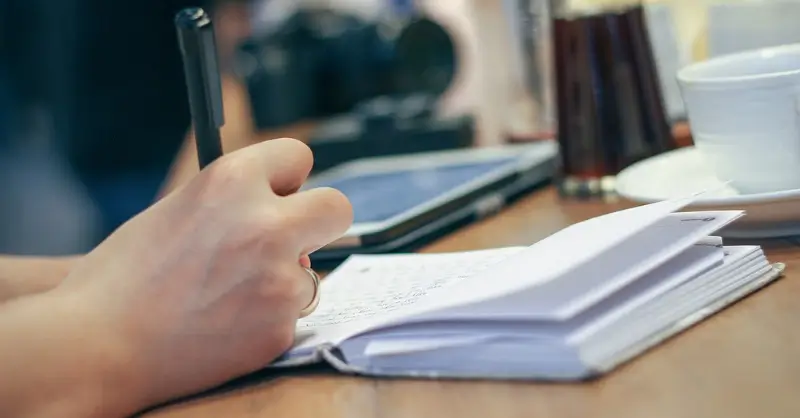
Students of history and literature would do well to approach note-taking as a jigsaw puzzle: put each piece in its proper place. If you want to make studying anything, from a literary classic to a historical timeline, more doable and test prep less stressful, then you need to learn how to take good notes. Your notes can be a powerful tool for learning, comprehension, and memorization when you know how to use them.
How about we examine some sophisticated methods of taking notes?
Table of Contents
Why Taking Notes Can Change Everything
Being a skilled note-taker requires more than just paraphrasing your lecture or highlighting key phrases in your textbook. Extracting useful information from large amounts of unstructured data by means of systematic collection, analysis, and transformation is known as data mining.
Literature students go through this procedure to find recurring themes, analyze characters, and write down memorable lines. Examining events, their causes and consequences, and key figures and dates are all part of historical analysis.
Without a strategy, all that data may be overwhelming. Conversely, you can save time and learn more about your subject by taking good notes. The classroom is not the only place where learning should be natural and enjoyable. That is the fundamental point.
Start With the Right Tools
Whatever note-taking aids you use will determine how efficient you are. No one wants to go up to a test unprepared, does it? It’s like getting ready for battle. Whatever works best for you—the physical experience of pen and paper or the convenience of digital platforms—is what matters most.
If you’re a fan of traditional methods, invest in a good-quality notebook and experiment with systems like Cornell notes or bullet journaling. Keep your pages neat, leave some margin space for additional thoughts, and use colored pens or highlighters sparingly to emphasize key points.
On the other hand, if you lean toward technology, apps and websites like Edubirdie study notes, OneNote, or Evernote can be game-changers. Digital tools offer features like searchable text, cross-device syncing, and templates for lecture notes or book summaries or different study notes. You can easily organize your notes into folders for different classes or topics, making retrieval a breeze when exam season rolls around.
Focus on the Big Picture First
It is common for students to get mired down in the nitty-gritty of a new subject when they are learning it. While it is important to pay attention to detail, you will have more room to maneuver if you outline the major points first.
To do this in literature, one may first need to determine the novel’s major themes or conflicts before delving into individual chapters or sections. Consider Macbeth’s larger examination of ambition and morality before diving into scene-by-scene analysis.
Similarly, in history, begin with a general understanding of the timeline or major events. Don’t rely on memorization alone; think about the relationships between events. Consider not just that the French Revolution started in 1789, but also that economic inequality and political turmoil were major factors in sparking the revolution and its far-reaching effects. The tiny details will make more sense when you have a firm grasp of the larger story.
Make Note-Taking an Active Process
Taking notes word for word in a textbook or during a lecture isn’t the best approach to learn. In contrast, actively taking notes entails interacting with the content in a way that enhances comprehension and memory. Instead of paraphrasing, try putting the concepts into your own words to create a summary.
If you’re researching what led up to World War I, for instance, it’s not enough to just record the alliances involved or the major events. Reframing the material in a way that makes sense to you is preferable. For example, you may describe how rising tensions across Europe were influenced by imperialism and nationalism. In literature, instead of just writing down what a character does, think about what it says about their character or their part in the tale.
One more method to keep involved is to ask questions. Write down a question to go back to later if something isn’t obvious. For instance, when you dive into Hamlet, you might wonder why Hamlet is hesitant to kill Claudius or how the themes of uncertainty and mortality are interwoven throughout the play. Considering the solutions to these questions will stimulate your curiosity and lead you on the correct path when reviewing your notes.
Stay Organized for Easier Review
When notes are disorganized, not even the best ones will help. In order to make your notes easily reviewable when you need them most—for example, the night before an exam or when preparing for a big essay—it is crucial to organize them clearly.
Dividing your notes into several sections or categories can help you stay organized. To do this with literary works, you may need to divide your notes into sections on themes, character analysis, and important passages. For historical purposes, it could be helpful to organize your notes according to significant people, events, or causes and effects. Your notes will be much easier to find what you need if you use headings and subheadings.
Diagrams, timetables, and mind maps are all examples of visual tools that can be very useful. To better understand the American Revolution, for instance, it can be helpful to make a timeline that includes both the main battles and important political events. In a similar vein, a mind map can illustrate the interconnectedness and overlap of a novel’s topics.
Review and Revise Often
You shouldn’t just jot down some notes and then disregard them. Make sure to schedule regular review time to get the most out of them. You only need to spend ten minutes a day skimming over the content to help retain it.
Look for places where you still don’t comprehend anything while you review. In order to make your notes more concise, you can rewrite or condense sections of them. If something feels missing, you can also add extra details. Passing on your knowledge to another person is a great strategy to ensure that you retain it. Once you can explain a literary concept or historical event to a friend with confidence, you will know you have a firm grip on the material.
The key to effective note-taking in literature and history classes is not to adhere to a strict formula, but rather to develop a method that suits you and maintain an active interest in the subject matter. Your notes can become a study tool that breaks down even the most complicated subjects provided you use the correct tools, keep your focus on the overall picture, and remain organized.
Rather than attempting to commit every word to memory, you should concentrate on comprehending, evaluating, and drawing connections when you read or listen to an academic presentation in the future. With dedication and the right approach, your notes have the potential to become a priceless asset in your academic journey.
After all, well-organized notes are like a map: they lead you through the maze of data until you reach the final goal, which is certainty and understanding.










